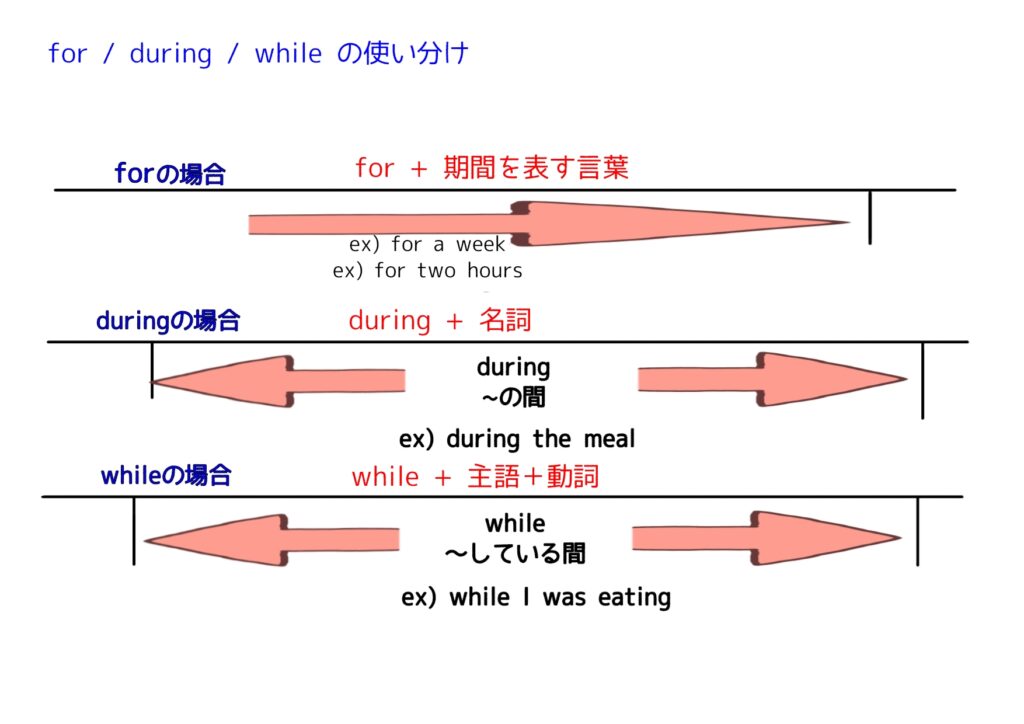第79回:「いつのことか」を表す副詞を一気に確認。

「時」を表すことの出来る副詞の使い方・意味・ニュアンス等を一気に確認してしまいましょう。
Q. この記事で、一番大事なことって何?
A. 大事なことを、1枚の画像にまとめました。

いちいちノートにまとめるのが面倒だという方、また、
ノートにまとめることが苦手だという方は、ご活用ください。

[広告]
確かな英語力は、日々の継続から。
その継続を後押しする、第二言語習得理論に基づいた
オンライン英語学習プログラムがあります。
英語を使う人のための、確実なスキルアップが望める
7日間の無料体験はこちらから!

As, when, and while
as, when, or whileを使って「〜する間に」という意味で、何か別のことが起こることを伝える事があります。
- As/When/While Miguel was eating, the doorbell rang.(ミゲルが食事をしている間に、ドアベルが鳴った)
when(asやwhileではなく)は、次のような場合に節を導入するために使用します。
☆主節で行われるより長い出来事と同時に起こるイベント。
☆主節でのイベントが起こる状況:
When they are fully grown these snakes can be over two metres long.(成長が完了すると、これらの蛇は2メートル以上になることがあります)
また、whenは「毎回」という意味で使われることもあり、過去の人生の期間について話す際にも好まれます。
例1:I still feel tired when I wake up in the morning.(朝起きた時にはまだ疲れを感じる)(「毎回」)
例2:His mother called him Robbie when he was a baby.(彼の母親は彼が赤ん坊の頃に彼をロビーと呼んだ)(過去の期間)一つのイベントが別のイベントの直後に起こる場合、特に一つが他を引き起こす場合、通常はwhenを好みます。
例3:You’ll see my house on the right when you cross the bridge.(橋を渡った時に、右に私の家が見えます)
例4:When the lights went out, I lit some candles.(ライトが消えたとき、私はろうそくを灯しました)
例3の文では、「as」や「while」を使って「〜を渡っている間に」という意味を示す事ができ、(… as/while you are crossing…)。例4の文では、「as」や「while」は使えません。なぜなら、ライトは通常瞬時に消えるからです。
一つのことが変化すると、別のことも同時に変化することを言う場合には、「as」を好みます。
例:As the cheese matures, its flavour improves.(チーズが熟成するにつれて、味が良くなります)(「When the cheese…」よりも好まれます)
連続時制を伴う場合、「While…」を使用することもあります。「While the cheese is maturing…」
Before, after, and until
私たちは、あるイベントが別のイベントよりも前または後に発生することを話すために、beforeまたはafterを使用します。
I put on my coat before I went out.(外出する前にコートを着ました)
The message arrived after I’d left.(出発した後にメッセージが届きました)
副詞節に示された時間まで継続する状況では、通常、untilまたはbeforeのいずれかを使用することができます。
I had to wait six weeks until/before the parcel arrived.(私は荷物が到着するまで6週間待たなければならなかった)
ただし、untilは特定の時間まで続くアクションについて話し、その後停止することを話す場合に使用します。
They sat on the beach until the sun sank below the horizon, and then they went home.(彼らは太陽が地平線の下に沈むまでビーチで座っていました。その後、彼らは家に帰りました)
また、副詞節が主節のアクションの結果を表す場合にも、untilを使用します。
He cleaned his shoes until they shone.(彼は靴を磨いて、輝くようになりました)(「磨く」の結果が「輝く」である)
Hardly, no sooner, scarcely
あるイベントが別のイベントの直後に起こったことを伝える場合、hardly, no sooner, scarcelyを使用することがあります。
hardlyとscarcelyの後には、2番目の節がwhenまたはbeforeで始まります。no soonerの後には、thanまたはwhenで始まります。
・The concert had hardly begun before all the lights went out.(コンサートが始まったばかりの時に、すべてのライトが消えた)
・I had no sooner lit the barbecue than/when it started to rain.(バーベキューを点火した直後に、雨が降り始めた)
hardly、no sooner、scarcelyの後には、過去完了形を使用し、もう一方の節には過去形を使用することが一般的です。
正確な副詞節の使用は、文の意味を明確に伝える上で重要です。
具体例
- As, when, and while:
- As/When/While I was cooking dinner, the phone rang.
- They were playing soccer in the park when it started to rain.
- When they reached the top of the mountain, they felt a sense of accomplishment.
- When I was younger, I used to visit my grandparents every summer.
- As the sun sets, the colors in the sky become more vibrant.
- Before, after, and until:
- I finished my homework before I went to bed.
- The concert ended after midnight, so I had to catch a late bus home.
- I waited until/before the traffic cleared before I started driving.
- They stayed at the party until the music stopped and the lights turned on.
- He cleaned the house until it was spotless.
- Hardly, no sooner, scarcely:
- Hardly had I closed my eyes when the alarm clock went off.
- Scarcely had she finished her speech when the audience erupted in applause.
- No sooner had they left the house than it started snowing heavily.
- I had hardly started reading the book when I realized it was missing a few pages.
- Scarcely had they arrived at the airport when their flight was announced.
[広告]
TOEICのスコアを上げたいけれど、
まとまった勉強時間が取れなくて困っている…
なら、細かいスキマの時間を使いながら、
少しずつスキルを積み重ねてみてはどうでしょう。
スマホ1つでスコアアップが出来る、
オンライン講座のリンクはこちらから。

Q. この文法はどうやって使うのでしょうか?
A. 今回の文法を活用した会話文を見てみましょう。

Hardly had I started studying for the exam when my friends invited me to a party.
(勉強を始めた時に、友達がパーティーに誘ってくれたんだ。)

It must have been difficult to choose between studying and going to the party.
(勉強とパーティーのどちらかを選ぶのは難しかっただろうね。)

It was definitely a tough decision. On one hand, I knew I needed to focus and prepare for the exam. But on the other hand, I didn’t want to miss out on a fun night with my friends.
(本当にそう。一方では試験に集中して準備しなきゃいけないと分かっていたけど、もう一方では友達と楽しい夜を過ごしたかったんだ。)

I can understand the dilemma. Did you end up going to the party?
(そのジレンマは分かるよ。最終的にはパーティーに行くことにしたの?)

Well, I thought about it for a while and realized that a little break from studying wouldn’t hurt. So, I decided to join my friends and have a good time.
(まあ、しばらく考えた結果、少しの休憩は問題ないだろうと思ったんだ。だから、友達と一緒に楽しむことに決めたんだ。)

That sounds like a reasonable choice. Sometimes it’s important to take a break and enjoy yourself.
(それもそうだね。時には休憩を取って楽しむことも大切だよ。)
[広告]
ロゼッタストーン・ラーニングセンターで、最先端の教育制度を活用して英語を学びませんか?私たちは個々の学習ペースに合わせてeラーニングと対面教育を組み合わせ、柔軟な学習環境を提供しています。自宅でのeラーニングと対面教育のメリットを最大限に活かし、あなたの英語学習をサポートします。最新のテクノロジーと個別の指導が組み合わさった当センターで、自由な学習スタイルを体験してみませんか?英語学習を楽しく効果的に進めるための環境がここにあります。新たな一歩を踏み出して、新しい英語学習の旅に参加しましょう!

Q. この記事の要点は?
A. 「時」を表す副詞について確認しました。
Adverbial clauses of time:
- As, when, and while:
- Used to mean ‘during the time that’ when something else is happening.
- “When” introduces an event that occurs at the same time as a longer event or describes the circumstances in which the main event happens.
- “When” can also mean ‘every time’ or refer to past periods of our lives.
- “As” is used to indicate that one thing changes simultaneously with another.
- “While” is used to talk about two longer actions happening at the same time.
- Before, after, and until:
- “Before” and “after” are used to indicate events happening earlier or later than another event.
- “Until” and “before” can often be used interchangeably when describing a situation that continues up to a specific time.
- “Until” is used when an action continues until a particular time and then stops or when describing the result of an action.
- Hardly, no sooner, scarcely:
- Used to express that one event happens immediately after another.
- “Hardly” and “scarcely” are followed by “when” or “before,” while “no sooner” is followed by “than” or “when.”
- Past perfect is often used in the clause with “hardly,” “no sooner,” or “scarcely,” while the other clause is in the past simple.
英会話を始めてみたいけれど、どのサービスが良いか分からない…
そんな方は、まず、この記事で3つのサービスを比べてみてはいかがでしょうか?
英語力を効率良く伸ばすことができるサービス3選です。

次回の文法解説は?
理由を表すための表現。
この記事を作る際に参考にした文法の解説書になります。
すべて英語で書かれていますが、練習問題が付いてます。
イギリス英語なので、スペル等の表記が異なる部分もありますが、
「使い方を練習したい」「繰り返し問題を解きたい」
という方は、使ってみても良いかもしれません。

関連記事一覧
他の文法解説記事を検索できます。






-320x180.jpg)





コメント